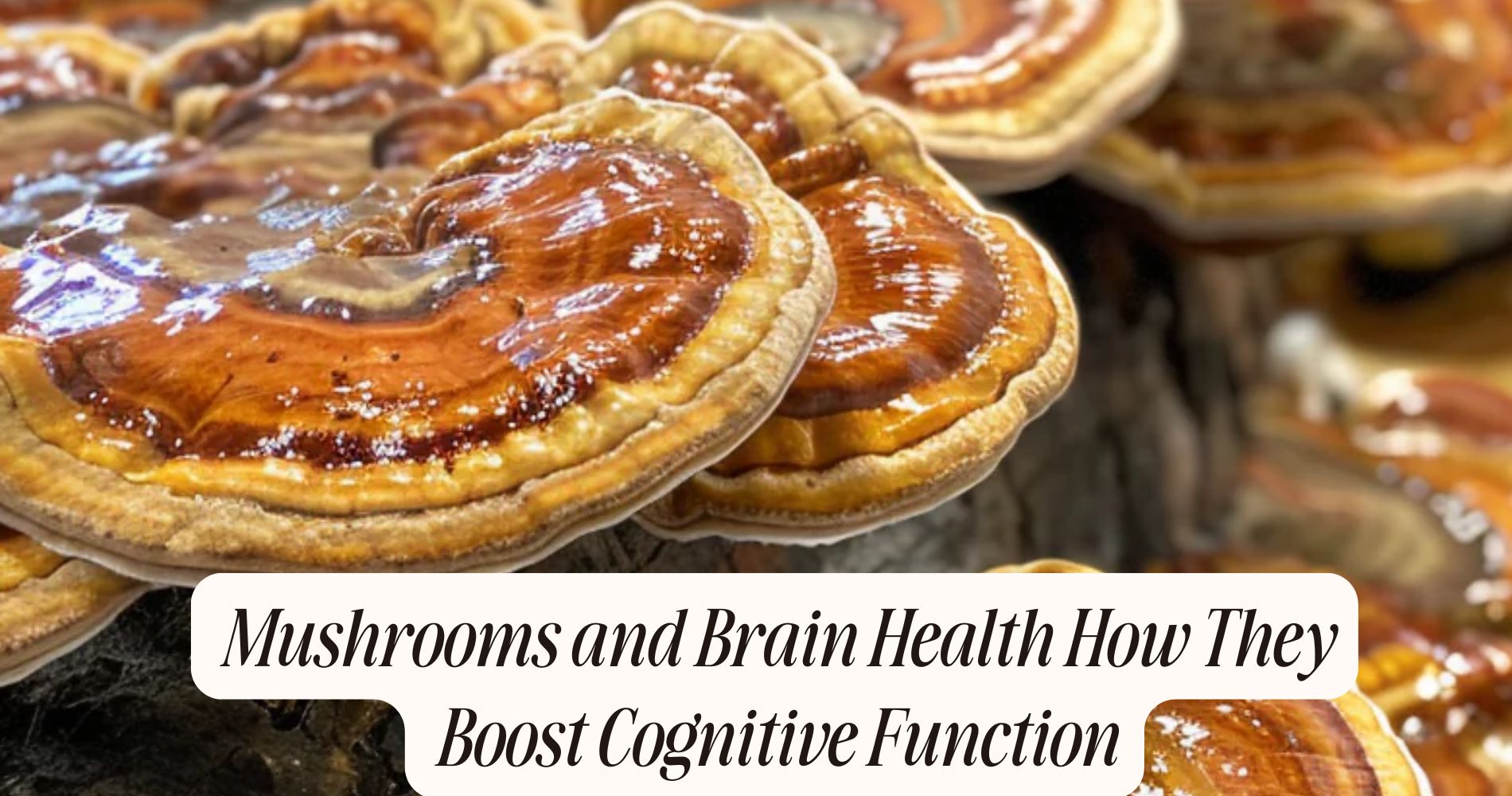
Mushrooms and Brain Health How They Boost Cognitive Function
Mushrooms and brain health go hand in hand, thanks to their unique bioactive compounds that support cognitive function. Varieties like lion’s mane and reishi are known to enhance memory, focus, and nerve regeneration. Rich in antioxidants, mushrooms help combat oxidative stress, which may reduce the risk of cognitive decline. Additionally, their ergothioneine and polysaccharides protect brain cells and support overall mental clarity. Adding these powerful fungi to your diet can promote long-term brain health—discover more about their incredible benefits today!
The Nutritional Powerhouse of Mushrooms
When you consider the nutritional benefits of mushrooms, it's clear they pack a powerful punch for your health. Various mushroom varieties, such as shiitake, maitake, and porcini, are rich in essential vitamins and minerals, including B vitamins, copper, and selenium. These nutrients support metabolic processes and enhance immune function.

Furthermore, mushrooms are low in calories and a great source of dietary fiber, which aids digestion and promotes satiety. Research highlights that incorporating mushrooms into your diet can lead to improved heart health due to their cholesterol-lowering properties.
Additionally, their unique composition of antioxidants helps combat oxidative stress. By adding diverse mushroom varieties to your meals, you can enjoy their numerous nutritional benefits while enriching your overall diet.
Key Bioactive Compounds That Support Brain Health
While mushrooms offer a variety of nutritional benefits, certain bioactive compounds within them play an integral role in supporting brain health.
These compounds, such as ergothioneine and polysaccharides, provide significant bioactive benefits. Ergothioneine acts as a powerful antioxidant, protecting your brain cells from oxidative stress, which is linked to cognitive decline.
Polysaccharides, particularly beta-glucans, contribute to immune support and may enhance neuroprotection. Additionally, various mushrooms contain cognitive compounds like hericenones and erinacines, which have been shown to promote nerve growth factor synthesis.
This process is vital for maintaining the health and functionality of neurons. By incorporating mushrooms into your diet, you can leverage these bioactive compounds to support and potentially improve your brain health over time.
How Mushrooms Enhance Cognitive Function
Mushrooms can greatly enhance cognitive function, thanks to their rich array of nutrients and bioactive compounds. Various studies suggest that specific mushrooms, such as lion's mane and reishi, contribute to memory enhancement by promoting neurogenesis—the growth of new neurons.
This process helps improve synaptic connections, which are essential for effective communication between brain cells. Additionally, mushrooms contain polysaccharides and antioxidants that may bolster cognitive resilience, enabling your brain to better withstand stress and age-related decline.

The compounds found in mushrooms work synergistically to support overall brain health, making them a valuable addition to your diet. Incorporating these fungi into your meals could be a simple yet effective way to boost your cognitive function and protect your mental agility.
The Role of Antioxidants in Preventing Cognitive Decline
Antioxidants play an essential role in preventing cognitive decline by neutralizing free radicals that can damage brain cells. These harmful molecules are linked to oxidative stress, which contributes to neurodegeneration.
By incorporating foods rich in antioxidants, such as mushrooms, you activate antioxidant mechanisms that provide significant cognitive protection. Research shows that compounds like ergothioneine and glutathione found in mushrooms enhance your brain's resilience against oxidative damage.
This protection is crucial for maintaining cognitive function as you age. Additionally, a diet high in antioxidants can improve memory and slow the progression of neurodegenerative diseases.
Popular Mushroom Varieties for Brain Health
When exploring options for enhancing brain health, specific mushroom varieties stand out due to their unique nutritional profiles and bioactive compounds.
Lion's mane is particularly remarkable for its potential to stimulate nerve growth factor (NGF) production, which supports cognitive function and memory.
Meanwhile, reishi benefits are linked to its stress-reducing properties, which can improve mental clarity and focus.
Shiitake effects include boosting overall cognitive function through essential amino acids and B vitamins that support brain health.

Cordyceps properties may enhance energy and stamina, indirectly benefiting mental performance by reducing fatigue.
Incorporating these mushrooms into your routine could provide a holistic approach to maintaining and enhancing cognitive abilities.
Each variety offers distinct advantages worth considering for brain health.
Incorporating Mushrooms Into Your Diet
To reap the benefits of the various mushrooms known for their positive impact on brain health, incorporating them into your diet can be both simple and rewarding.
Start by adding mushrooms like lion's mane or shiitake to your meals. You can sauté them with garlic and herbs or toss them into salads for added texture and flavor.
Explore diverse mushroom recipes, such as mushroom risotto or stir-fries, to keep your meals exciting. For dietary tips, try to include a variety of mushroom types each week to maximize their cognitive benefits.
Research Studies on Mushrooms and Cognitive Benefits
Recent studies have illuminated the potential cognitive benefits of mushrooms, particularly those like lion's mane and shiitake.
Mushroom research highlights that lion's mane contains compounds that may promote nerve growth factor (NGF) production, which is vital for brain health and cognitive function. In cognitive studies, participants consuming lion's mane showed improved memory and focus compared to control groups.
Shiitake mushrooms also offer benefits, as they're rich in antioxidants and anti-inflammatory properties that can support overall brain health.
These findings suggest that integrating mushrooms into your diet could enhance cognitive performance and potentially protect against neurodegenerative diseases.
As more mushroom research emerges, the link between mushrooms and cognitive benefits will continue to gain traction in the scientific community.
The Future of Mushrooms in Mental Health and Wellness
As research on mushrooms continues to advance, their potential role in mental health and wellness is becoming increasingly evident.
Emerging studies indicate that mushroom therapies, particularly those involving psilocybin and other bioactive compounds, may offer significant benefits for conditions like depression, anxiety, and PTSD. These therapies show promise in enhancing emotional regulation and fostering new neural connections.

Recent clinical trials demonstrate that participants report substantial improvements in mood and cognitive function after mushroom-based interventions.
As regulatory frameworks evolve, we can expect more widespread acceptance and integration of mushroom therapies into mainstream mental health practices. This shift could lead to innovative treatment options, empowering individuals to harness the cognitive and emotional benefits that mushrooms provide for overall well-being.
Boost Your Brain with Well Gummies
Looking for an effortless way to harness the brain-boosting power of mushrooms? SUPER MUSHROOM GUMMIES by Well Gummies make it easy! Packed with 10 functional mushrooms, including Lion’s Mane, Reishi, and Cordyceps, these vegan-friendly gummies support mental clarity, focus, and overall cognitive function. With a delicious wild berry flavor, they’re as tasty as your favorite candy—without the jitters or crash. Experience calmer energy and sharper thinking in a convenient chewable form. Fuel your brain naturally and keep your mind sharp all day long!
Frequently Asked Questions
Are All Mushroom Varieties Beneficial for Brain Health?
Not all mushroom varieties offer cognitive benefits. Some species contain compounds that may enhance brain health, while others lack significant nutrients. It is crucial to research specific types for their potential effects on cognitive function before consumption.
Can Mushrooms Replace Traditional Medications for Cognitive Issues?
While mushrooms show promise as cognitive alternatives, they shouldn't replace traditional medications outright. You should consider their efficacy carefully, balancing evidence with professional advice to guarantee ideal brain health and function.
How Much Mushroom Intake Is Recommended for Brain Benefits?
For ideal brain benefits, you should aim for a daily intake of about 100-200 grams of specific mushroom varieties, like lion's mane and reishi. These amounts can help enhance cognitive function effectively over time.
Are There Any Side Effects of Consuming Mushrooms for Cognitive Health?
You should be aware that consuming mushrooms can lead to mushroom toxicity in some cases, particularly with wild varieties. Additionally, allergic reactions might occur, so it is important to start with small amounts and monitor your body's response.
Do Cooking Methods Affect the Brain Health Benefits of Mushrooms?
Yes, cooking techniques can impact the nutritional preservation of mushrooms. Methods like steaming or sautéing may retain more beneficial compounds compared to boiling, which can lead to nutrient loss. Choose carefully to maximize health benefits.
Conclusion
Incorporating mushrooms into your diet could be a simple yet effective way to support brain health and cognitive function. With their rich array of bioactive compounds and antioxidants, mushrooms offer promising benefits for mental well-being. As research continues to reveal their potential, you might find that these nutritional powerhouses not only enhance your meals but also contribute to a sharper mind. Embracing mushrooms could be a step toward better brain health and overall wellness.




